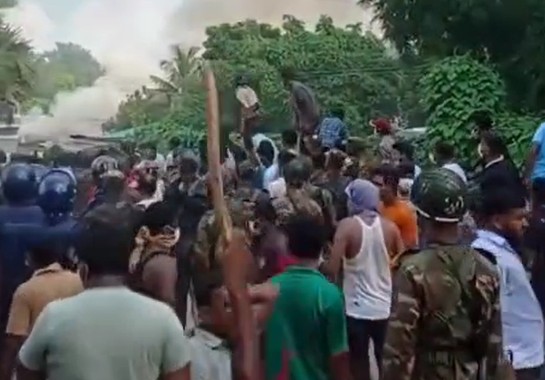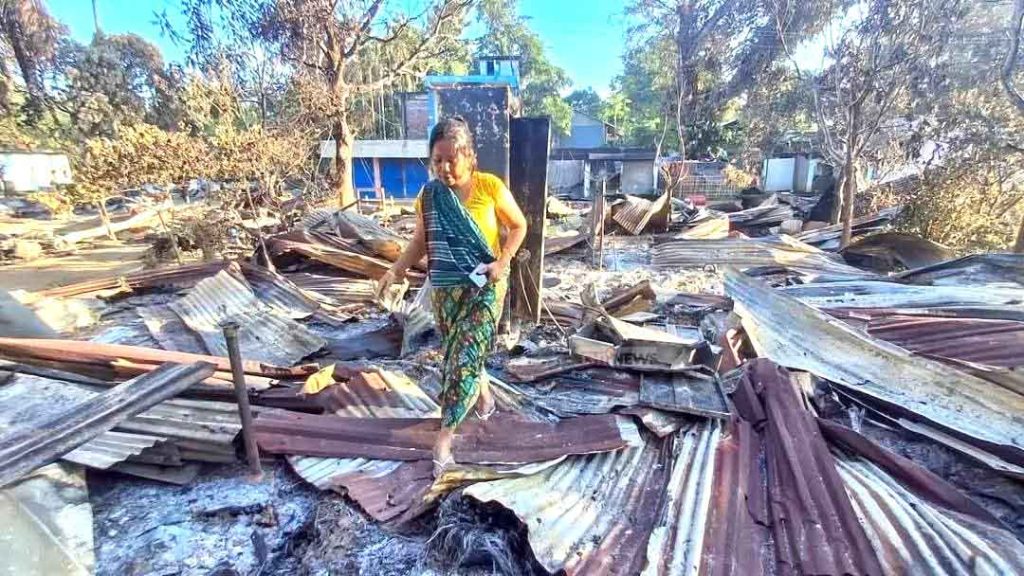Report on the Communal Attack by the Army and Settlers on the Hill People in Khagrachari and Guimara, Chittagong Hill Tracts
By
Human Rights Monitoring Cell
United Peoples’ Democratic Front (UPDF)
Published: Monday, October 6, 2025
A. Summary
On September 28, 2025, a horrific communal attack was carried out by the Bangladesh Army and illegal settlers in Ramsu Bazar, a Marma-majority area under Guimara Upazila, Khagrachhari District. In this attack, 3 hill people of the Marma ethnic group were killed, and at least 50 Marma people were injured by gunshots, many of whom sustained serious injuries.
The previous day, that is on September 27, settler Bengalis carried out attacks in the Upazila Parishad area of Khagrachari Sadar, as well as in Mahajan Para and the Yongdo Buddhist Monastery areas of Pankhaiya Para. Six people were injured there.
When the Army and the vigilantes backed by them fired indiscriminately, people were forced to flee in fear. Taking advantage of this, settlers extensively looted Marma shops and homes. Following the looting, they burned down more than 50 shops across 15 plots in the market, 15 residential houses, 16 rented accommodations, 1 private office, 1 turmeric warehouse (owned by a Bengali), 17 motorcycles, and 1 Mahindra vehicle, reducing them to ashes. The attackers also vandalized several houses.
B. Context of the Attack
On the night of September 23, 2025, an 8th-grade Marma girl student in Shinginala, Ward No. 1 of Khagrachari Municipality, was gang-raped by three Bengali youths. That very night, a platform named “Jumma Chattra Janata” (Jumma Student and Mass People) announced a protest in Khagrachhari Sadar for the following day (September 24).
On the same day (September 23), around midnight, the victim’s father went to Khagrachari Sadar Police Station to file a case. After staying at the station all night, the police authority accepted the case in the early morning of September 24. Later that morning, the Army and Police went to the spot in Shinginala and, with the help of locals, arrested one individual named Chayon Shil (19), son of Bappi Shil. The other two accused either managed to escape or were mysteriously helped to evade arrest.
Protesting the rape, the Jumma Chattra Janata held a demonstration at Muktamancha in Khagrachhari Sadar on September 24 and called for a half-day road blockade across Khagrachari District on September 25 and a Mass Anti-Sexual Harassment Rally on September 26, demanding the arrest and proper trial of all those accused in the rape.
According to their declared program, a spontaneous half-day road blockade was observed across Khagrachari District on September 25. However, at 8:30 PM that night, the Army forcibly dragged, abused, and took Ukyanu Marma—an organizer of the Jumma Chattra Janata and General Secretary of the Khagrachari District Branch of the Bangladesh Marma Students’ Council—from Madhupur Bazar in Khagrachari Sadar to the Khagrachari Army Brigade headquarters.
When this incident became public, hundreds of people took to the streets in Panikhaiya Para, Shinginala, and other areas to protest the detention of Ukyanu Marma. Consequently, the Army was forced to release him from the Khagrachhari Cantonment at around 10:30 PM. Immediately after his release, people rushed to Panikhaiya Para. There, Ukyanu Marma addressed the agitated crowd and urged everyone to join the mass rally the next day (September 26).
The detention and harassment of Ukyanu Marma greatly angered the students and youths. A large number of student youth participated in the mass rally organized on September 26. From this rally, Ukyanu Marma declared a full-day road blockade for September 27.
Attack in Khagrachari Sadar
The all-out blockade program started from the morning of September 27. While the blockade was proceeding peacefully, at one point around noon, the situation became tense in the Cultural Institute and Technical School and College area of Khagrachari Sadar when a few settler youths on auto-rickshaws (Tomtom) and motorcycles created provocation, leading to a verbal altercation with the picketers. Although they left initially, they returned shortly afterward in an organized manner and attacked the blockaders. Clashes and chases/counter-chases occurred in the Khejur Bagan (Upazila Parishad) area. The settlers severely wounded one person with a machete there. Several others were injured in their attack. Some of the injured include Rikon Chakma alias Barije from Boradam village, Dighinala (a pickup truck driver); Bakulu Marma, son of Thoihri Marma, from Shinginala Marma Para, Khagrachari; and Kalaiya Marma, son of Thuihla Pru Marma, from the same village. Among them, the settlers severely injured Rikon Chakma by hacking him with a sharp weapon. He is currently undergoing medical treatment.
In this situation, the Khagrachari District Administration imposed Section 144 in Khagrachari Municipality and Sadar Upazila from 2:00 PM. The Army and Police arrived at the scene in Khejur Bagan. However, even after the clash stopped there, the settlers violated Section 144 by going to Mohajan Para and attempting to attack and vandalize the business establishments and houses of the hill people.
The settlers then attempted to attack the Yongdu Buddhist Temple on the south side of Khagrachari Bazar in the evening. When locals resisted, the settlers started attacking the crowd gathered in front of the temple. The Army and Police tried to disperse the attackers by firing blank shots and throwing sound grenades. Even in the presence of the Army and Police, settlers seriously wounded 3 hill people (Marma) with machetes. They are Kumia Tripura (25), Mongsa Aung Marma (22), and Mong Hla Marma.
While Khagrachari town saw communal attacks on the hill people by settlers, the blockade program was observed fully and peacefully in other Upazilas. However, on the same day, the Guimara Upazila Administration also imposed Section 144 in Guimara, even though no untoward incident like those in Khagrachhari Sadar had occurred there.
In light of these events and demanding justice for the previous rape, the Jumma Chattra Janata announced an indifinite road blockade program from September 28 on their Facebook page that night.
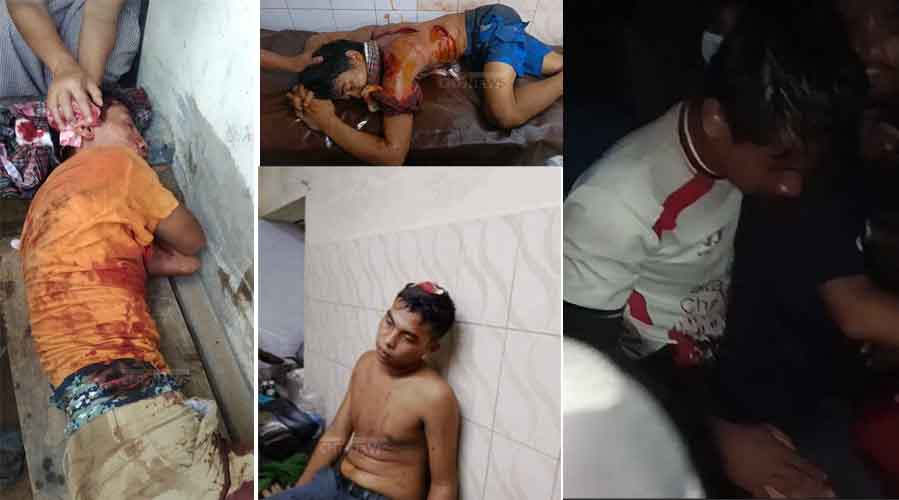
Attack in Guimara
According to the announced program, from 9:00 AM on September 28, the students and mass of people of the Guimara area began observing a blockade in front of the Town Hall in Ramsu Bazar by burning tires and placing logs on the road. While they were peacefully observing the blockade, the Army attacked the blockading students and masses of people without provocation, leading to chases and counter-chases. This is how the attack started. After several rounds of chases and counter-chases, illegal settlers and military-backed vigilantes joined the Army and jointly attacked Ramsu Bazar.
C. What Happened That Day in Guimara?
During the Jumma Chattra Janata’s blockade, a contingent of the Bangladesh Army from Guimara Brigade arrived at the scene around 10:30 AM. Citing the imposition of Section 144, they pressurized the students and masses of people to lift the blockade. They informed the blockaders that one accused had been arrested and taken on remand. However, the blockaders commented that this was not enough and was merely a pretense. They continued their peaceful blockade. At this point, the Army personnel entered the crowd of blockading students and masses and dispersed them by baton-charging.
Following this, there were several rounds of chases and counter-chases between the Army and the agitated students and masses. Subsequently, Bengali settlers were brought in from Guimara Bazar and Jalia Para, along with an armed group of vigilantes. At one stage, the Army and the vigilantes fired indiscriminately at the agitated students and masses, while the settlers went into Ramsu Bazar, carried out extensive looting, and then set fire to the shops and residential houses. The Ramsu Bazar area instantly turned into a death zone. People fled for their lives in every direction possible. Many were shot and fell to the ground.
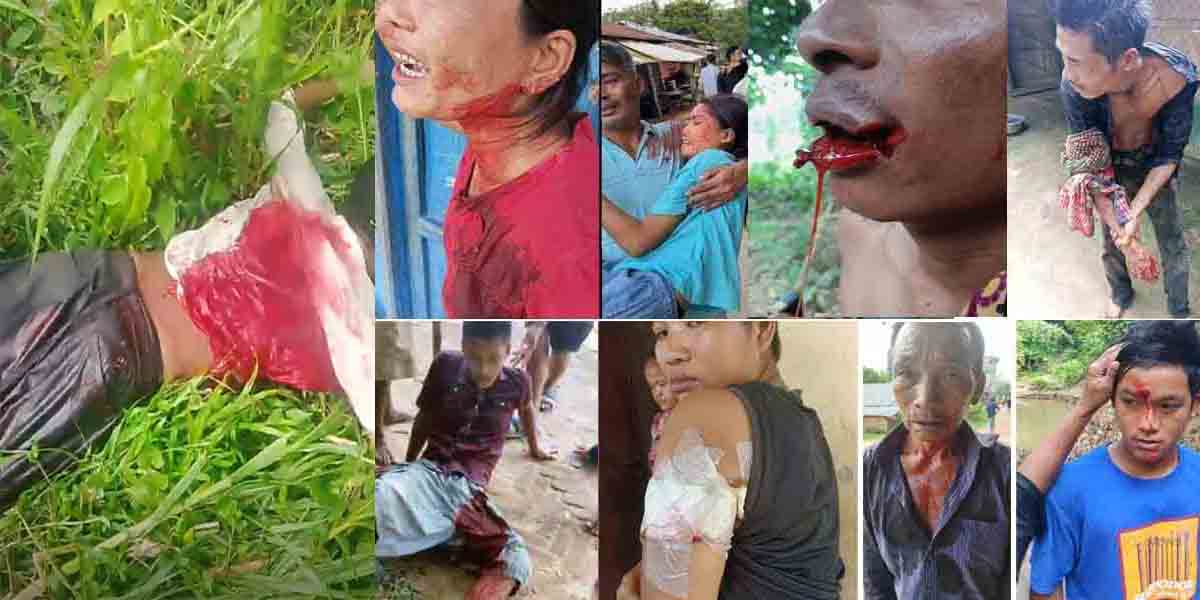
According to eyewitnesses, a section of settlers attempted to attack Amtoli, a Marma-dominated area next to Guimara Bazar (southeast). However, other Bengali individuals there obstructed them. Consequently, the hill people’s settlements in Amtoli were saved from the settler attack.
The severity of the attack was revealed when a video went viral on social media showing a father carrying his injured 10th-grade daughter, Uhlame Marma (14), who had been rescued. The student was injured after being hit on the head by a settler attack. It is believed she was struck on the head with the intention to kill.
D. Damages
In this barbaric attack, 3 hill people were killed on the spot, and 50 hill people were injured by gunshots, many of whom are still undergoing treatment in hospitals with serious wounds. One person, whose condition is critical, has been transferred to Chittagong for advanced treatment. Many injured individuals have not registered their names out of fear and are receiving treatment privately at home instead of going to the hospital. The injured include several women, one of whom is known in the area as a person with a mental disability.
The three people killed in the attack are:
- Thoaiching Marma (25), son of Hlachai Marma, village- Bottola Para, Hafchhari, Guimara (a driver by profession);
- Akhra Marma (24), son of Apru Marma, village – Shingguli Para, Borpilak, Guimara; and
- Athuipru Marma (26), son of Thoihlaong Marma, village- Lichu Bagan, Hafchhari, Guimara.
The identities of some of those being treated for gunshot wounds are known. They are:
- Chingkyao Marma (25), son of Redakko Marma, village- Notun Para, Guimara, Khagrachhari (under treatment at Khagrachhari Sadar Hospital)
- Ongching Marma (23), son of late Mongsai Marma, village- Ramesu Bazar, Guimara, Khagrachhari (under treatment at Khagrachhari Sadar Hospital),
- Sachhingnu Marma (24), father unknown, village- Bottola, Guimara, Khagrachhari (under treatment at Khagrachhari Sadar Hospital),
- Kongjoshai Marma, son of Dilip, village- Amtol, Guimara, Khagrachhari, (under treatment at Khagrachhari Sadar Hospital),
- Athuipru Marma (45), son of Chiniaong Marma (under treatment at Khagrachhari Sadar Hospital),
- Ong Marma (Koong), age 27, son of Rampruchai Marma, village- Boroitoli, Guimara, Khagrachhari (under treatment at Khagrachhari Sadar Hospital),
- Kongchaihla Marma (45), son of Uhlaong Marma (under treatment in Chittagong),
- Bikash Tripura (23), son of Ami Kumar Tripura, village- Kumendra Karbari Para, Guimara, Khagrachhari (under treatment at Khagrachhari Sadar Hospital),
- Kyajai Marma (25), father unknown, (under treatment at Khagrachhari Sadar Hospital),
- Jewel Chakma (23), son of Faluni, village- Pathachhara, Hafchhari Union, Guimara Upazila, Khagrachhari (under treatment at Khagrachhari Sadar Hospital),
- Anuma Marma (21), son of Uraong Marma, village- Chowdhury Para, Ward No. 9, Guimara Sadar UP, Khagrachhari,
- Abaima Marma (70), village- Ugalchhari, Panchhari, who was visiting relatives in Guimara (under treatment at Khagrachhari Sadar Hospital),
- Anuma Marma (21), son of Uraong Marma, village- Chowdhury Para, Ward No. 9, Guimara Sadar UP, Khagrachhari (mentally disabled).
The arson attack by Bengali settlers damaged more than 50 shops across 15 plots, 15 residential houses, 16 rented homes, 1 private office, 1 turmeric warehouse (Bengali-owned), 17 motorcycles, and 1 Mahindra (three-wheeler) vehicle in Ramsu Bazar. Many houses were also vandalized. Before setting fire to the market, settlers carried out extensive looting in shops and homes. Locals allege that they carried the looted goods away on vans. The financial damage from the arson, vandalism, and looting in Ramsu Bazar and surrounding residences is estimated to be several crores of Taka.
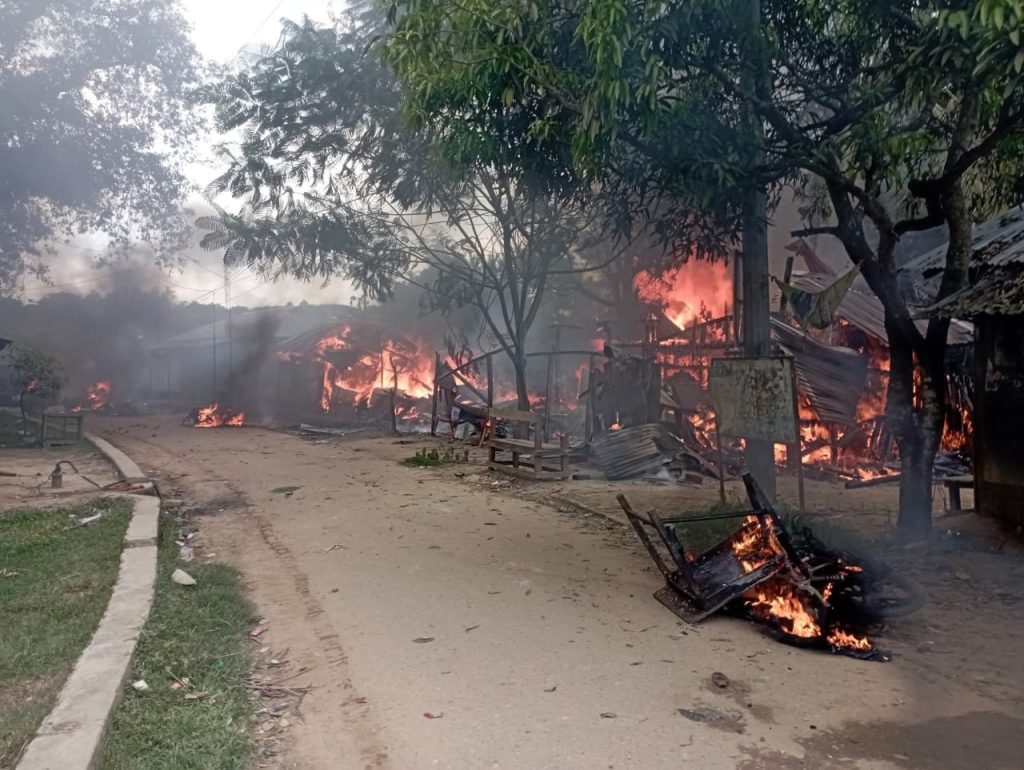
E. Administrative Pressure to Cremate the Bodies Overnight
The next day (September 29), at 9:30 PM, the bodies of the three deceased were handed over to their near relatives from the Khagrachari Sadar Hospital. There are allegations that the Khagrachari Sadar Hospital delayed handing over the bodies under the pretext that the post-mortem was not complete.
While the vehicles carrying the bodies, under police escort, were on their way from the hospital, they were held for nearly half an hour at the Matiranga Army Zone checkpoint. After being released from there, the bodies reached their respective villages at around 11:30 PM. To escort each vehicle carrying a body, two Army vehicles and one Police vehicle were assigned. Locals reported that in addition to the Army and Police, the Mottaleb Bahini vigilantes were also present with the vehicles carrying the bodies of the deceased Thoaiching Marma of Bottola village and Akhra Marma of Shingguli Para village.
The Guimara Upazila Administration pressurized the relatives of the deceased to cremate the bodies overnight. This created a sense of fear among the villagers. Under administrative pressure, they were eventually forced to cremate the bodies in the middle of the night without fully observing religious and social customs.
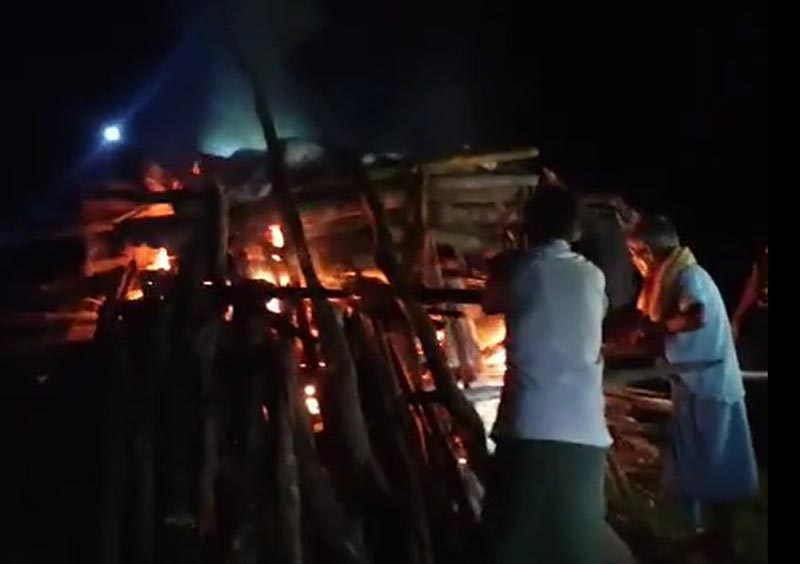
F. Who Were the Attackers, Looters, and Arsonists at Ramsu Bazar?
The names of those involved in the attack and arson at Ramsu Bazar include:
- Bishwajit (Grocer and Paddy Trader + 2 laborers), Guimara, Khagrachari;
- Abu, Doctor Tila (Welding Mechanic), Guimara, Khagrachari
- Dilip, Doctor Tila (Oil Shopkeeper), Guimara, Khagrachari,
- Khokon (Grocer), Guimara, Khagrachari,
- Russel, Babul Member Para (Grocer), Guimara Bazar, Khagrachari,
- Tipu, son of Matiur Rahman, Bazar Para (Nur Pharmacy), Guimara Bazar, Khagrachari,
- Ronjit, College Road (Gaza Seller), Guimara Bazar, Khagrachari,
- Md. Sohag (35), Muslim Para (Fruit Seller), Guimara, Khagrachari,
- Arman (38), son of late Amir Hossain, Jalia Para, Guimara, Khagrachari,
- Jalal (50) Turmeric Trader, Amtol Para, Guimara, Khagrachari,
- Torof Ali (48), Jaliapara, Guimara, Khagrachari,
- Mahbub Ali (Timber Trader), Borpilak, Guimara, Khagrachari,
- Ali Hossain (26), Muslim Para, Guimara, Khagrachari,
- Belal (40), Muslim Para, Guimara, Khagrachari,
- Robiul, Muslim Para, Guimara, Khagrachari,
- Dulal, Muslim Para, Guimara, Khagrachari,
- Kamal, Muslim Para, Guimara, Khagrachari,
- Robiul (President, Guimara Motorcycle Drivers Association), Guimara, Bazar, Khagrachari,
- Robiul (22), Muslim Para, Guimara, Khagrachari,
- Ariful Islam Arif, Guimara, Khagrachhari (Workshop owner),
- Md. Yusuf, son of Jahangir, Jaliapara, Guimara, Khagrachari,
- Abul Kasem (65), son of Taleb, Jaliapara, Guimara, Khagrachari,
- Belal (Workshop owner), Guimara, Khagrachari,
- Belal (Workshop owner),
- Ruhul Amin, (Grocer), Guimara, Khagrachari,
- Latif (Fertilizer Shopkeeper), Guimara Bazar, Khagrachari,
- Mizan (Grocer), Guimara, Khagrachhari,
- Torun (Cosmetics Shopkeeper), Guimara, Khagrachari,
- Emon (Crockery Shop),
- Mosharraf, Nabang Para (Fruit Seller), Guimara, Khagrachari,
- Gias (Grocer), Guimara Bazar, Khagrachari,
- Tarek, son of Momin Sowdagor (Grocer), Guimara Bazar, Khagrachari,
- Bablu Barua, son of Sudatta Barua (Crockery Shopkeeper), Guimara Bazar, Khagrachari,
- Midul Barua (Grocer), Guimara, Khagrachari,
- Shahidul, Muslim Para (Timber Trader), Guimara, Khagrachari,
- Dr. Choton (Pharmacy owner), Guimara Bazar, Khagrachari,
- Din Islam, owner of Nazma Hotel, Guimara, Bazar, Khagrachari.
G. Who is Responsible for the Attack?
The testimonies of eyewitnesses, videos published on social media, and statements from human rights activists clearly indicate that the Army and illegal settlers perpetrated this barbaric attack on the Marma-dominated Ramsu Bazar. There are allegations that an armed group of the military-backed vigilantes also joined them.
Nur Khan, a prominent human rights activist in Bangladesh, in an interview with Deutsche Welle, held the Bangladesh Army responsible for the attack on the Marma community in Guimara, Khagrachari. In that interview, he stated, “The video we have seen of the incident clearly shows that the Army fired indiscriminately in Guimara. Local Bengalis were also with the Army.”
Shefali Tripura, an eyewitness, alleged, “The Army could have fired blank shots or rubber bullets. But they didn’t; they fired live ammunition directly. They could have avoided that. They had many ways to stop our hill boys. They could have used tear gas if necessary. But they didn’t. Why would they fire live rounds directly?”
She continued, “The bullets came from the direction of the road. Our hill boys, though coming from this side, had no weapons. They had bricks or sticks. The bullets came from the direction of the main road. They fired indiscriminately; bodies fell from the bullets; even girls were shot. They fired so wildly it’s beyond words. We only heard about the ’71 War or saw it in films on TV. Now I saw it in reality. Does this seem any less than the ’71 War to you?”
According to another account, the Army-backed vigilantes (whom he referred to as “reformist, democratic”) were the ones who fired the live rounds. When asked why they fired, he said, “The Army has created a conflict between the hill people.”
In a video circulated on social media, another person is heard expressing his anger towards the Army, saying, “They are supposedly deployed for peace. So where is the peace here? The situation here is worse than Gaza, Palestine.”
Another 19-second video clip circulating on social media shows settlers, armed with sticks and sharp weapons, standing with the Army and shouting “Allahu Akbar, Naraye Takbir,” while the Army is unleashing barrages of fire. The settlers are heard supporting the Army’s firing by shouting “Allahu Akbar.” This brief video footage confirms that the attack was a combined effort by the Army and the settlers.
H. Motive of the Attack
The attack, murder, looting, and arson that took place on September 28 in Ramsu Bazar and the adjoining area in Guimara were pre-planned. Ramsu Bazar, being very close to Guimara Bazar, had become a source of envy for many businessmen. They viewed this growing market as a rival because the hill people from many nearby villages could procure their daily necessities from this market and did not need to go to Guimara Bazar.
On the other hand, the Army did not view a market run by hill people so close to the Guimara Army Brigade favorably. They desire to have only Bengali settlements around their camp for “security” reasons. For this reason, Ramsu Bazar became an eyesore for a certain class of businessmen and the Army. They began conspiring to destroy this Marma-dominated market. They seized the day of the road blockade, September 28, as the opportune moment for the attack.
The objectives of targeting Ramsu Bazar were: 1) To break the economic backbone of the emerging Marma traders in Guimara. 2) To prevent Ramsu Bazar from becoming a rival to Guimara Bazar. 3) To evict the Marma people from Ramsu Bazar and its surrounding areas, seize their land, and thus turn the area into a Bengali Muslim settler-dominated region. 4) To reduce the “security risk” for the Guimara Brigade.
I. ISPR’s Statement Regarding the Incident and the Response
Despite the Army’s direct involvement in the attack, the Inter-Services Public Relations (ISPR) issued a statement to the media that night, presenting a false account of the incident. In the statement, they tried to absolve the Guimara Brigade soldiers of responsibility by distorting the event. They placed all the blame on the UPDF, even though the UPDF had no involvement in the road blockade in the Ramsu Bazar area that day. The blockade was observed by local students and masses of Guimara at the call of the Jumma Chattra Janata. The Army resorted to inventing a fabricated story in their statement to cover up their own crime, which is completely contrary to the accounts of eyewitnesses and victims.
Simultaneously, the country’s mainstream media (with a few exceptions) also echoed the ISPR, distorting the incident and failing to report the actual facts of the attack. Consequently, the public could not access the correct information about the Guimara attack and had to rely on social media.
In response, the United Peoples’ Democratic Front (UPDF) issued a counter-statement, rejecting the Army’s statement as a “pack of lies and a failed attempt to conceal their own crimes.” UPDF spokesperson Aongay Marma stated, “The Bangladesh Army’s attempt to mislead the nation with false information about the Khagrachari and Guimara attacks will have a negative impact on the ongoing situation in the hills and will encourage the attackers.” Human rights activist and women’s leader Khushi Kabir commented that the ISPR statement was one-sided. In an interview with Deutsche Welle on October 1, 2025, she said, “The statement issued by ISPR about this incident is entirely one-sided. This will further create distrust among the indigenous people.” The Khagrachari Jumma Students also rejected the ISPR statement in a separate release, labeling it as “falsehood.”
J. Reactions
Protests against the attack, murder by shooting, looting, and arson in Guimara have taken place in various locations, including Chittagong, Dhaka, Rajshahi, Kaukhali, and Bandarban. Furthermore, expatriate organizations have organized protests abroad in South Korea, Geneva and France. Preparations for protests in other countries are reportedly underway.
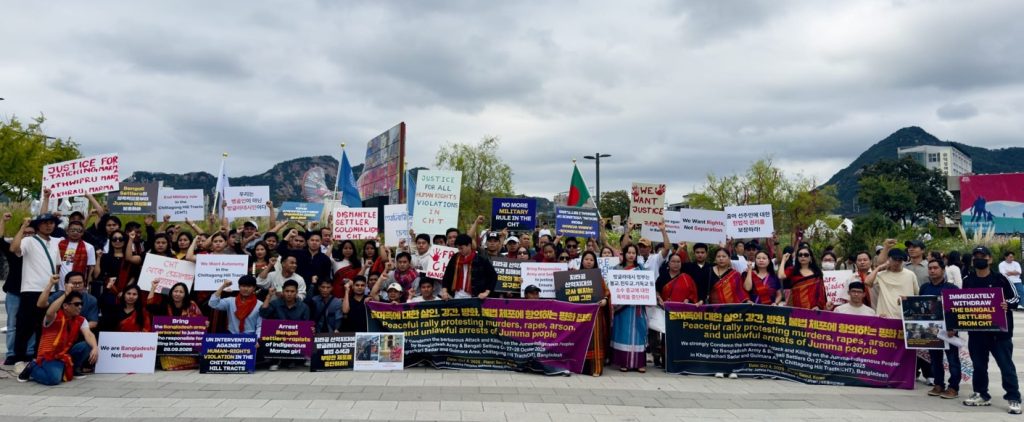
Various political parties, student organizations, human rights organizations and individuals, and students have issued statements demanding a fair investigation and justice for the attack. Comrade Bazlur Rashid Firoz, General Secretary of the Central Committee of the Workers Party of Bangladesh (BSD), stated in a release, “Instead of taking the demands of the protesting people into account and taking action against the terrorists following a series of rapes and oppression, the protesting crowd was brutally attacked in the presence of the Army.” He strongly condemned and expressed anger over the heinous attack, saying, “The Chittagong Hill Tracts today is like a piece of Gaza, Palestine, inside Bangladesh.”
Mukta Baroi, President, and Raihan Uddin, General Secretary of the Central Committee of the Socialist Student Front, condemned the attack in a statement, saying, “Even after the fall of the fascist government, the interim government has shown no different indication of the old autocratic mindset of suppressing the just movement of the hill people and maintaining unjust Army rule in the hills by presenting the movement to the public in the guise of ethnic-communal incitement.”
Comrade Masud Rana, Coordinator of the Central Executive Forum of the Workers Party of Bangladesh (Marxist), expressed condemnation and anger over the death of three people by gunfire and the burning down of houses, stating, “The interim government, the Army, and the administration had the responsibility to take effective measures to rapidly arrest the rapists, ensure fair trial, and pacify the protests. But instead, the Army’s firing on the blockaders in Guimara and the burning down of the hill people’s houses have resulted in 3 deaths, escalating the situation further. The Army attack and firing on the students and masses protesting for the fair trial of a heinous crime like gang-rape is a gross violation of democracy and human rights. This incident proves once again that the Army rule in the hills plays a role in protecting the interests of the state’s ethnic oppressors against the hill people of the Chittagong Hill Tracts.”
Junaid Saki, Chief Coordinator, and Abul Hasan Rubel, Executive Coordinator of the Ganosamhati Andolan (Mass Solidarity Movement), jointly condemned the attack in a statement, saying, “We are extremely angry about the casualties and arson that occurred today while protests were ongoing after the gang-rape of an indigenous school student in Khagrachari on Tuesday. We call for a proper investigation into the role of the Army and Police surrounding this incident and for appropriate action to be taken.”
Hema Chakma, Executive Member of DUCSU, in a statement on her Facebook profile, condemned and expressed anger over the attack and killings, saying, “As a human being, I understand the value of another person’s life. As citizens of Bangladesh, the complete responsibility for ensuring the safety of our lives lies with the state. The administration must bear the full cost of compensation and treatment for the families of those already killed and injured.”
She added, “To break down the wall of distrust between the hills and the plains, one must listen to and comprehend the sorrows of the indigenous people of the hills. I want every citizen of Bangladesh to have the right to seek justice for the rape of their sister, and at the same time, the state must ensure the safety of their lives.”
K. Role of Local Administration and Government Post-Attack
The day after the incident, September 29, at an event organized in the Old Ramna Police Station premises in the capital, Home Affairs Advisor Jahangir Alam Chowdhury said, “A quarter is attempting to create an unstable situation in Khagrachari. This incident is happening due to the instigation of India or the fascists.” (Source: Prothom Alo)
After the attack, on September 30, the Khagrachari Deputy Commissioner A B M Iftekharul Islam Khondokar, along with the District Council Chairman Shefalika Tripura and a team from the District Administration, visited the site and distributed relief among the victims. However, many refused to accept the relief offered.
That day, the Deputy Commissioner announced his support for the victims and the injured and committed to taking the initiative for their rehabilitation and treatment. He also mentioned meeting with the blockade organizers and assured them that 7 out of their 8 demands would be met. The Deputy Commissioner announced the formation of a 5-member investigation committee for the incident (Source: Kaler Kantho). However, he did not disclose the composition of this committee.
However, the United Peoples Democratic Front (UPDF) rejected the investigation committee formed by the District Administration and demanded a fair and impartial investigation involving the United Nations. Meanwhile, it is known that the police have filed two separate cases regarding the violence in Guimara. 250 to 300 unknown individuals have been made accused in the cases.
L. Recommendations to Prevent Future Attacks
Communal attacks like the one in Guimara, Chittagong Hill Tracts, are not new. For decades, as part of the policy of ethnic cleansing, the military-ruling class has been using genocide, communal attacks, land grabbing, and rape as tools of ethnic oppression against the hill peoples. Last year, on September 19 and 20, 4 hill people lost their lives in communal attacks in Dighinala, Khagrachari, and Rangamati. Although a committee was formed to investigate that attack, the investigation report has not been published to date, and those responsible for the attacks have not been punished. The government’s purpose for forming investigation committees is to protect the perpetrators, not to punish them. Therefore, the hill people have no trust in the investigation committee announced by the Khagrachari administration for the Guimara incident.
In this situation, the following recommendations are submitted to the Government of Bangladesh to prevent such violent communal attacks in the Chittagong Hill Tracts in the future:
- Immediately identify the Army personnel and settlers involved in the attack and take legal action against them, provide adequate compensation to the families of those killed, ensure proper medical treatment for the injured (in Guimara and Khagrachari), and provide appropriate compensation and rehabilitation to the affected families and businesses in their respective places.
- Stop the Army’s patronage of ultra-communalist settlers and take the initiative to honorably rehabilitate the settlers in the plains.
- Repeal the state policies hostile to the hill people introduced by previous fascist governments in the Chittagong Hill Tracts.
- Immediately stop the malicious attempts to divert the incident by propagating false and fabricated news following the Guimara attack.
- Punish the Army personnel involved in the communal attack and killings and withdraw Khagrachari Region Commander Brigadier General Hasan Mahmud and Guimara Region Commander Brigadier General Md. Samsuddin Rana from the Chittagong Hill Tracts for failing to protect the hill people from the attack.
- Take the initiative for a fair and impartial investigation involving the United Nations into the attack.
- Withdraw the ongoing military rule “Operation Uttoron” in the Chittagong Hill Tracts and ensure a fair democratic environment.
United Peoples’ Democratic Front (UPDF) Human Rights Monitoring Cell.
ঁ Report (pdf): click here.

